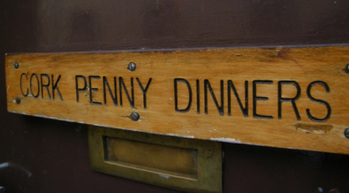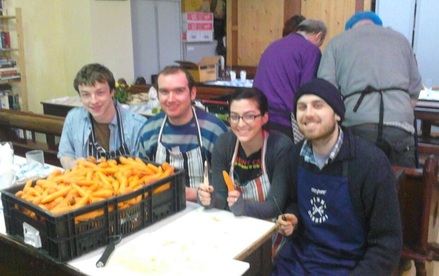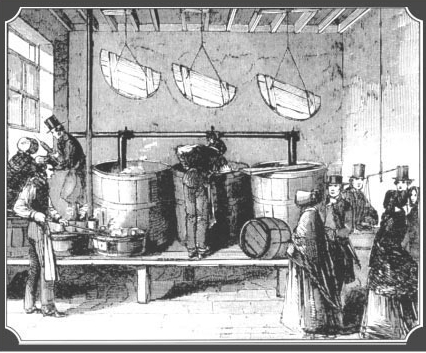
Sean Bent discusses Cork Humanists’ involvement in local community work, the origins of morality, and tackling a climate of exclusion towards the non-religious.
For a few weeks now, I’ve been volunteering at Cork Penny Dinners as part of the Humanist Values in Action Program (HVAP) with Cork Humanists.
For a few weeks now, I’ve been volunteering at Cork Penny Dinners as part of the Humanist Values in Action Program (HVAP) with Cork Humanists.
Cork Penny Dinners opens 7 days a week, 365 days a year including Christmas Day, 11.30am – 12.30pm, serving nourishing meals to anyone in need. The kitchen and dining room are at 4, Little Hanover Street, Cork, a small road branching off of Washington Street near Fine Wines. Sandwiches and fruit are given as a takeaway to provide an evening meal. All food is given free of charge. The organisation gratefully accepts any donations of money or foodstuffs that may be given (butter, coffee, and tinfoil are a priority). Each Saturday, members of Cork Humanists volunteer at the charity between 8am – 1pm. We periodically have a collection of donations to Penny Dinners. The next one is on 3 March at our next monthly meeting.
The Charity is one of Cork’s oldest caring organisations. It has ties right back to the soup kitchens run by the Society of Friends (Quakers) at the time of the Famine in the 1840’s. Now the charity is run on a multi-denominational basis by volunteers of all religions and none
I’m happy to say I’ve thoroughly enjoyed my experience in this kind of community work as part of the HVAP. Everyone pitches in on their own initiative; if you see vegetables that need chopping, you chop them; if you see dishes that need washing, you wash them; if you see tables that need scrubbing, you scrub them. The work has given me plenty of opportunities to make friends with the other volunteers. I have laughs and interesting conversations with different people while I move from task to task.

Members of Cork Humanists peeling carrots
It always brings a massive smile to my face to see the results of our work: hot meals ready to be eaten in a clean space for people in need. It’s wonderful to feel like I’ve contributed to something charitable. A little time and effort is a generosity that can make all the difference for some who are less well off than others. If just one person felt well-fed and a little uplifted as a result of the effort I gave then it makes the whole experience worth it in my view.
Aside from personal fulfillment and a wish to help my fellow humans, there is another significant motive for my volunteerism. I’m hoping to be a part of a group causing a shift in peoples’ perception of the non-religious worldwide. It is indisputable that there is a climate of intolerance towards the non-religious. This is a particularly well characterised phenomenon in the USA. A long string of polls has shown that a substantial section of the American population would not vote an atheist into office, even if that individual was qualified for the role. Here in Ireland, one still cannot become a Judge or President without swearing an oath to the Judeo-Christian god. Across many countries in the Middle East, apostasy (leaving one’s religion) is punishable by arrest or execution at worst and massive social stigma at best.
Such views and actions are partly fueled with the idea that one cannot be good without god; that morality derives from commandments handed down to humanity from a deity or deities. On the other hand, Humanists typically agree with the view put forward by the Amsterdam Declaration, that “morality is an intrinsic part of human nature based on understanding and a concern for others, needing no external sanction.” In other words, moral behaviour is a built-in part of our nature and humans naturally have the ability to be compassionate.
Ending a climate of exclusion begins with challenging age old prejudices. A practical step towards that is for Humanists to take part in local community work. By putting time and effort into charitable projects and local development, Humanists can begin to tackle the harmful stereotype of self-centred atheism. The Humanist Community at Harvard has been doing such work for years.
Ending a climate of exclusion begins with challenging age old prejudices. A practical step towards that is for Humanists to take part in local community work. By putting time and effort into charitable projects and local development, Humanists can begin to tackle the harmful stereotype of self-centred atheism. The Humanist Community at Harvard has been doing such work for years.
“to better the conditions of life for others through service to humanity, build alliances between religious and nonreligious individuals and communities, and combat the misconception that the nonreligious do not contribute to society" - Humanist Community at Harvard on the benefits of Humanist Community work.
If Irish Humanists wish to see change in the way the non-religious are viewed by theists, contributing to our local communities will be crucial. I hope the HVAP’s continued involvement in Cork Penny Dinners will dispel some prejudiced notions amongst the Cork community. It’s likely the project will help people generally, and especially people of faith, to realize that a fast growing percentage of Irish society does not need a god to be good. We are good, that is all.
Is community work the way forward to challenging and changing prejudices about the non-religious? Are there other local community works that you think would like Cork Humanists to get involved with? Give your opinion, leave a comment.
If you wish to get involved with Cork Humanists local community work, email [email protected] for further information
Sean Bent is editor of Cork Humanists Blog, holds a BSc from University College Cork and is pursuing a career in journalism. Follow him on twiiter: @seanbent90 (https://twitter.com/seanbent90)


 RSS Feed
RSS Feed
